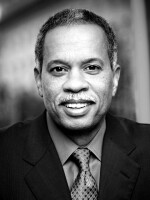RENEE MONTAGNE, host:
The Olympics are a political show for every host country but especially this year with the games in China. Some observers refer to this year's production as modern China's coming-out party on the world stage.
NPR news analyst Juan Williams is in China as a guest of the Committee of 100, a non-partisan Chinese-American forum. Over the weekend, he attended a dinner in Beijing that had a distinctly political dimension, and he joins us to talk about that. And Juan, I hear that the guest list at this event included two men who were in the early days of U.S.-China relations - Henry Kissinger and former President George H. W. Bush.
JUAN WILLIAMS: Exactly right, Renee. I caught up with them at a party hosted by the China-U.S. Exchange Foundation and the China Heritage Fund inside the Forbidden City. This was the Jian Fu Palace, and it's been sort of restored after it was burned to the ground early in the 20th century, and now it is suddenly back in its glory as an ancient Chinese court.
So I spoke with Henry Kissinger, and I've got to tell you, Renee, he was in a different mood. He was nostalgic about the work he did in the '70s, when he was the first American official, if you'll remember, to cross into communist China, and then he met with Prime Minister Chou Enlai in 1971, and that set up President Nixon's first meeting with Mao Zedong in 1972.
MONTAGNE: What did Henry Kissinger tell you about what's on his mind about the tremendous changes that China has undergone?
WILLIAMS: You know, it was quite emotional for him, Renee. He said he couldn't imagine China today as compared to the China that he knew and touched 30 years ago, but he also said, you know, this was the one time in his whole career, and you think back on his days with, you know, Vietnam, Nixon, but he said: I know I made a difference for the good in terms of his work on China, and I just - I felt it, you know, when he said it.
MONTAGNE: The first President Bush, also in Beijing for the Olympics, and George H. W. Bush, he was the first American envoy after Nixon and Kissinger opened the door to China. What did the former president say about the new China?
WILLIAMS: Well, he was the liaison before there was full diplomatic ties established, and at the dinner in the Forbidden City, the former President Bush said he always felt U.S.-Chinese relations were going to be the key to the 21st century, and he said today he feels like a proud papa when he heard from Chinese President Hu Jintao that U.S.-China relations have never been better, and he said he expects that China and the U.S. will take the lead in dealing with global issues ranging from energy to climate change and terrorism.
MONTAGNE: Now, these two were - that we've speaking of, Kissinger and former President Bush, were guests of honor at this affair.
WILLIAMS: Oh boy, were they ever. The Chinese made quite a fuss over them, and when I spoke with Chinese officials, there was real love for Kissinger, for Bush, and some concern, interestingly, over American politics.
They've had such a good time in terms of Sino-U.S. relations with the Bush administration that there's some concern over a possible change coming with Senator Obama, so even though the Chinese leadership has taken issue with George W. Bush's call to them to increase respect for human rights, they seem pretty comfortable with him, Renee, as a known quantity, and they said, remember, the current President Bush as a young man was here visiting his parents in Beijing, riding his bicycle around the city back in that '74-to-'78 period when George H. W. was the first liaison from the U.S. to China. [POST-BROADCAST CORRECTION: George H.W. Bush was the U.S. liaison to China from October 1974 until December 1975.]
MONTAGNE: Juan, thanks very much.
WILLIAMS: You're welcome, Renee.
MONTAGNE: NPR news analyst Juan Williams speaking about his dinner in Beijing from where he is now, Chengdu, in Chengdu Province. Transcript provided by NPR, Copyright NPR.







